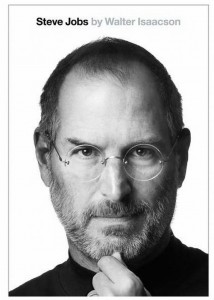Steve Jobs was my personal hero, his biography is a great reflection of his attitude and perspective on life. Here are my notes from the biography of Steve Jobs:

On simplicity and focus
- One of Jobs’s great strengths was knowing how to focus. Deciding what not to do is as important as deciding what to do he said. He had the power to focus like a laser beam.
- We needed to limit what the device itself would do. Instead we put that functionality in iTunes on the computer.
- Jobs’s intensity was also evident in his ability to focus. He would set priorities, aim his laser attention on them, and filter out distractions. He attributed his ability to focus and his love of simplicity to his Zen training. It honed his appreciation for intuition, showed him how to filter out anything that was distracting or unnecessary, and nurtured in him an aesthetic based on minimalism.
On his attitude
- “I sent emails to groups of people at 2 am and batted things around” he called. “We think about this a lot because it’s not a job, it’s our life.
- You should be proud of what we built.
- I am a reflection of what I do.
- “Can anyone tell me what MobileMe is supposed to do?” After the team members offered their answers, Jobs shot back: “So why the fuck doesn’t it do that?” You’ve tarnished Apples reputation. You should hate each other for having let each other down.
- Pixar had successfully reinvented Disney’s business… You would think the CEO of Disney would be curious how Pixar was doing that. But during the twenty-year relationship, he visited Pixar for a total of about two and a half hours, only to give little congratulatory speeches. He was never curious. I was amazed. Curiosity is very important.
- “Steve understands desire” said Alan Kay.
- When Jobs called, the place was fully booked. So he had the hotel approach people who had reserved the suite where he and Powell had stayed and ask if they would relinquish it.
- (Meeting with Obama) I’m not going to get slotted in for a token meeting so that he can check off that he met with a CEO.
- Great art stretches the taste, it doesn’t follow taste.
- “Is Disney happy with Pixar?” asked Jobs. With great exuberance, Katzenberg answered yes. Then Jobs asked, “Do you think we at Pixar are happy with Disney?” Katzenberg said he assumed so. “No, we’re not” Jobs said. “We want to do a film with you. That would make us happy.
On product design:
- Jobs was averse to having on-off switches, which he deemed “inelegant”
- If he wants a song or function, he should be able to get there in three clicks.
- He disdained the idea of having stylus or pen for writing on a screen. “God gave us ten styluses” he would say, waving his fingers. “Let’s not invent another”
- He loved to control all aspects of his life… One of his core principles was that hardware and software shoud be tightly integrated.
- Simplicity is the ultimate sophistication.
- Products have an essence to them, a purpose for which they were made. If the object were to have feelings, these would be based on its desire to fulfill its essence.
- (iPad) Jobs pushed for the purest possible simplicity. That required determining what was the core essence of the device.
- When they got to Istanbul, he hired a history professor to give his family a tour. At the end they went to a Turkish bath, where the professor’s lecture gave Jobs an insight about the globalization of youth… When we’re making products, there is no such thing as a Turkish phone, or a music player that young people in turkey would want that’s different from one young people elsewhere would want. We’re just one world now.
On business
- One of Jobs’s management philosophies was that it is crucial, every now and then, to roll the dice and “bet the company” on some new idea or technology.
- With the iPod, Jobs had transformed the music business. With the iPad and its App Store, he began to transform all media, from publishing to journalism to television and movies.
- “The soul of Adobe disappeared when Warnock left” Jobs said. “He was the inventor, the person I related to. It’s been a bunch of suits since then, and the company has turned out crap.”
- (Regarding getting record companies on iTunes) I’ve never spent so much of my time trying to convince people to do the right thing for themselves.
On Microsoft and Bill Gates
- “Bill likes to portray himself as a man of the product, but he’s really not. He’s a businessperson. Winning business was more important to than making great products.”
- Bill is basically unimaginative and has never invented anything, which is why I think he’s more comfortable now in philanthropy than technology. He just shamelessly ripped off other people’s ideas.
- The only problem with Microsoft is they just have no taste, they have absolutely no taste. I mean that in a big way, in the sense that they dont think of original ideas and they don’t bring so much culture into their product.
- We won because we personally love music. (iTunes vs Zune)
On Android
- “I like being responsible for the whole user experience. We do it not to make money. We do it because we want to make great products, not crap like Android.”
- I don’t see an advantage of putting our music app on Android, except to make Android users happy. And I don’t want to make Android users happy.
- “We believe we have a moral responsibility to keep porn off the iPhone” Jobs declared in an email to a customer. “Folks who want porn can buy an Android.”
Interesting anecdotes
- “I was on one of my fruitarian diets” he explained. “I had just come back from the apple farm. It sounded fun, spirited, and not intimidating, Apple took the edge off the word “computer”. Plus it would get us ahead of Atari in the phone book.”
- One of the first things jobs did during the product review process was ban PowerPoints. If you need slides, it shows you don’t know what you’re talking about.
- “If it could save a person’s life, would you find a way to shave ten seconds off the boot time?”. Jobs went to a whiteboard and showed that if there were five million people using the Mac, and it took ten seconds extra to turn it on every day, that added up to three hundred million hours per year, which was equivalent of at least one hundred lifetimes saved per year. Larry came back a few weeks later and it booted up twenty-eight seconds faster.”
- On the day he unveiled the Macintosh, a reporter from Popular Science asked Jobs what type of market research he had done. Jobs responded by scoffing, “Did ALexander Graham Bell do any market research before he invented the telephone?”
- (from an ad) The people who are crazy enough to think they can change the world are the ones who do.
- There are cars people are proud to have - Porsche, Ferrari, Prius - because what I drive says something about me.” Larry Ellison said.
- When I got the chance to come back to Apple, I realized that I would be useless without the company, and that’s why I decided to stay and rebuild it.
Overall, it was an amazing read. Highly recommended to anyone interested in technology.
